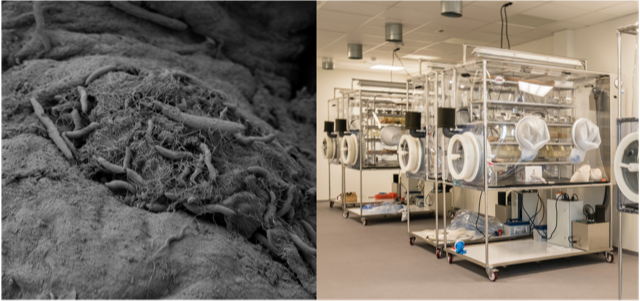
Host-Microbe Interactions in inflammatory disease and cancer
The Host-Microbiota-Interaction (HMI) lab studies the complex interplay between the intestinal microbiota and the host, during the development of inflammatory disease and cancer. We investigate the fundamental mechanisms underlying various inflammatory pathologies and colorectal cancer, using transgenic mouse models. The HMI lab established first Belgian Germfree and Gnotobiotic mouse facility, in which we rederive transgenic mouse models of human disease in germ-free and gnotobiotic conditions. This allows us to study diseases which are strongly influenced by the intestinal microbiota, both during disease development and during therapeutic interventions. We study how specific bacteria and fungi can promote colorectal cancer, and how specific bacteria can promote response to immunotherapy. We are collaborating with clinicians at the Ghent and Leuven University Hospitals to collect microbiota samples for functional characterization in the HMI lab. In addition, we have a special interest in goblet cell biology, and developed various transgenic models for goblet-cell gene editing and mucus depletion, which allow us to study the role of goblet cells in health and disease. Together, we aim to acquire a better understanding of how the microbiota influences gut biology and human health, which can lead to better microbiota-based therapies in various diseases.
Areas of Expertise
- Colorectal cancer
- Intestinal inflammation
- Germ-Free Mouse Technology
- Goblet cell Biology
Technology Transfer Potential
- Microbiome-based diagnostics
- Microbiome-based therapeutics
- Intestinal epithelial barrier interventions
Selected publications
- Jans, M. et al., Colibactin-driven colon cancer requires adhesin-mediated epithelial binding. Nature, 635, 472–480 (2024). Visit ➚
- Jans, M. et al, Physiological drivers of pks+ E. coli in colorectal cancer, Trends in Microbiology, S0966-842X(25)00121-0 (2025). Visit ➚
- Thiran, A. et al., Sterile triggers drive joint inflammation in TNF and IL-1β dependent mouse arthritis models. EMBO Molecular Medicine, 15: e17691 (2023). Visit ➚
- Jans, M. et al. A guide to germ-free and gnotobiotic mouse technology to study health and disease. FEBS J., 292(6):1228-1251 (2024). Visit ➚
- Slowicka, K. et al. Zeb2 drives invasive and microbiota-dependent colon carcinoma. Nature Cancer, 1, 620-634 (2020). Visit ➚
Bibliography
- Full bibliography Visit ➚


